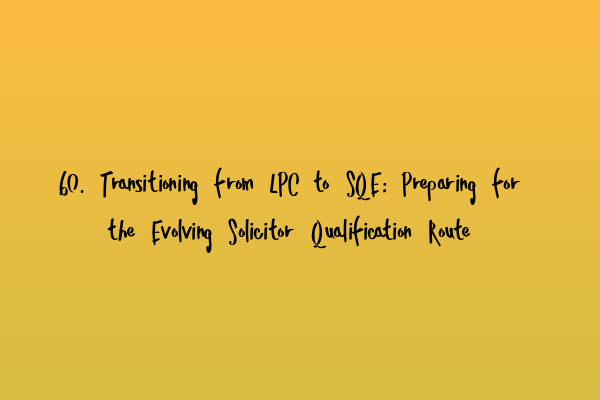Transitioning from LPC to SQE: Preparing for the Evolving Solicitor Qualification Route
The legal profession is undergoing a significant change with the introduction of the Solicitors Qualifying Examination (SQE). This new route to qualification as a solicitor in England and Wales is set to replace the traditional Legal Practice Course (LPC) and bring about a more standardized and flexible approach to legal training.
As an aspiring solicitor who has completed the LPC or is currently enrolled in it, it is essential to be aware of the transitioning process and adequately prepare for the new qualification route. In this blog post, we will guide you through the key aspects of transitioning from LPC to SQE and provide you with valuable tips to help you prepare for the evolving solicitor qualification route.
Understanding the SQE
The Solicitors Qualifying Examination (SQE) is a new assessment framework developed by the Solicitors Regulation Authority (SRA) as part of their ongoing efforts to modernize and streamline legal education and training. It is designed to assess candidates’ competence across a range of practical legal skills and knowledge required to practice as a solicitor.
The SQE is divided into two stages: SQE1 and SQE2. SQE1 focuses on testing candidates’ functioning legal knowledge through multiple-choice questions and legal research and writing exercises. On the other hand, SQE2 is focused on assessing candidates’ practical legal skills, including client interviewing, advocacy, legal drafting, and case analysis.
It is crucial to familiarize yourself with the structure and content of the SQE to effectively prepare for the examination. You can find detailed information on the SQE, including exam formats, assessment criteria, and study resources, on the SRA’s official website and other reputable legal education providers.
Preparing for the Transition
Transitioning from the LPC to the SQE requires careful planning and preparation. Here are some essential steps you should consider:
1. Stay Updated
Keep yourself updated with the latest developments and updates regarding the SQE and its implementation. Sign up for newsletters, follow relevant legal blogs, and engage with professional communities to stay informed and up-to-date.
2. Bridge the Knowledge Gap
The SQE assesses a broader range of legal topics compared to the LPC, incorporating both substantive and procedural law. Identify the knowledge gaps between what you covered in your LPC and what is required for the SQE. You may need to supplement your existing knowledge through self-study, online courses, or additional training programs.
Consider enrolling in SQE 1 preparation courses, which will help you revise the relevant legal topics and practice multiple-choice questions similar to those in the actual exam. These courses often offer online resources, study materials, and mock exams to facilitate your preparation.
You can also make use of SQE 1 practice exam questions and SQE 1 practice mocks FLK1 FLK2 to assess your progress and familiarize yourself with the exam format and question styles.
3. Enhance Practical Legal Skills
While the LPC primarily focuses on academic knowledge, the SQE places significant importance on practical legal skills. Evaluate your current skill set and identify areas for improvement. Utilize practical training courses and workshops to enhance your client interviewing, advocacy, drafting, and case analysis skills.
There are various courses available for SQE 2 preparation that specifically target the development of practical legal skills. These courses often provide simulated exercises and feedback from experienced practitioners to help you refine your skills to match the requirements of the SQE.
4. Create a Study Plan
Develop a comprehensive study plan that covers all the necessary topics and allows you to allocate sufficient time for revision and practice. Consider your personal learning style and create a study schedule that suits your needs and preferences.
Break down your study plan into manageable chunks and set achievable goals for each study session. Incorporate both self-study and interactive learning activities such as group discussions or online forums to enhance your understanding of the subjects.
Remember to include regular practice tests and mock exams to assess your progress and familiarize yourself with the exam format and time constraints. SQE 1 preparation courses and SQE 2 preparation courses often offer practice exams and mock tests to support your preparation.
5. Seek Professional Advice
If you are uncertain about any aspect of the transitioning process or need guidance in preparing for the SQE, do not hesitate to seek professional advice. Consult solicitors, legal educators, and career advisors who are knowledgeable about the SQE and its implications.
They can provide valuable insights, recommend appropriate resources, and help you tailor your preparation strategy to maximize your chances of success.
Conclusion
Transitioning from the LPC to the SQE is a significant step in your journey to become a qualified solicitor. By understanding the structure and content of the SQE and following a well-planned preparation strategy, you can effectively navigate the transition and position yourself for success in the evolving solicitor qualification route.
Remember to stay updated with the latest developments, bridge the knowledge gap, enhance your practical legal skills, create a study plan, and seek professional advice when needed. By doing so, you will be well-prepared to embrace the new solicitor qualification route and excel in the SQE.
If you’re looking for additional support and resources, check out our SQE 1 preparation courses, SQE 2 preparation courses, SQE 1 practice exam questions, SQE 1 practice mocks FLK1 FLK2, and SRA SQE exam dates.
